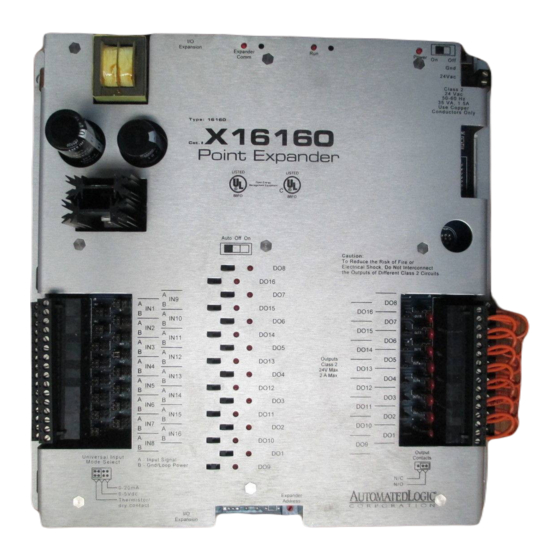Automated Logic MX16160 Technical Instructions - Page 4
Browse online or download pdf Technical Instructions for Extender Automated Logic MX16160. Automated Logic MX16160 7 pages.

6. Set the module's address. Refer to
"Addressing" on page 3 for details about
setting the address.
7. Turn the module's power switch on.
When the module turns on, the Run and
Power LEDs turn on. The Run LED begins
blinking and the Error LED turns off. See
"LEDs" on page 7 to troubleshoot the
LEDs. If the module does not respond, call
Technical Support at (770) 429-3002.
Inputs
The MX16160 module has sixteen universal
inputs to accept the types of signals listed
below. Refer to Table 1 for information about
wire length, gauge, and shielding.
• Thermistor: Precon type 2 (10kohm at
77°F). Input voltages should range
between 0.489V and 3.825V for
thermistors.
• 0 to 5VDC: The output impedance of a 0
to 5VDC source must not exceed
10kohms. The input impedance of the
MX16160 is approximately 1Mohm.
• 0 to 20mA: The input resistance on the
"A" input is 250 Ohms. The "B" terminal
supplies a voltage source to power the
4-20mA transducer. The "B" terminal is
capable of supplying 18 to 24VDC, but
the total current of all "B" terminals
must not exceed 320mA. If the voltage
measured from the "B" terminal to Gnd
is less than 18VDC, you need to use an
additional external power supply.
• Dry Contact: A 5VDC wetting voltage is
used to detect contact position. This
results in a 0.5mA maximum sense
current when the contacts are closed.
The MX16160 accumulates up to 15 input
pulses per second.
Revised 9/13/00 • MX16160
Table 1. Input wiring restrictions
Maximum
Input
Length
0 to 5VDC
50 feet
15 meters
Thermistor
50 feet
Dry contact
15 meters
0 to 20mA
150 feet
46 meters
1. Be sure the MX16160's power is off before
wiring any inputs or outputs.
2. Connect the input wiring to the screw
terminals on the module as shown in
Figure 3 on page 5.
NOTE If a 4-20 mA sensor uses an
external 24VAC power supply, connect
one leg of the 24VAC supply to the module
ground.
3. Set the configuration jumper for each
input to indicate the type of input used.
Make sure the jumper is positioned
correctly, and be sure to grip the jumper
by the sides only. See Figure 4 on page 5.
4. For each input, enter the channel number,
offset, and gain on the Function Block's
Parameter page in SuperVision. Valid
channel numbers are listed in "Channel
Numbers" on page 6.
5. To verify each input's operation, have
each sensor create a known value and
compare it to the condition reported on
the FB's Status page.
4
© 2000 Automated Logic Corporation
Minimum
Gauge
Shielding
24AWG
shielded and
grounded to
"
"
module's
B
or Gnd
terminal
24AWG
shielded and
grounded to
"
"
module's
B
or Gnd
terminal
20AWG
unshielded
